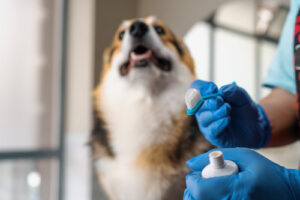Diarrhea in dogs can be concerning for any pet parent. If your furry friend is experiencing this discomfort, it’s important to understand some of the common causes that may be affecting your canine companion. Though this article provides useful insights, please remember to consult with professional veterinary care if your pet is unwell. For personalized consultation, reach out to Sunset Animal Hospital in Houston, TX, at (713) 526-5881 to schedule an appointment.

1. Dietary Changes
An abrupt change in your dog’s diet can lead to digestive upset, including diarrhea. New food brands, an increase in portion sizes, or the introduction of unfamiliar treats might be the culprits.
2. Food Intolerance or Allergies
Dogs, like humans, can suffer from food allergies or intolerance. Such adverse reactions can trigger diarrhea. If you’ve recently introduced new ingredients into your dog’s diet and noticed a change in their stool, an allergy or intolerance could be the cause.
3. Ingestion of Indigestible Substances
If your dog has a habit of scavenging or eating non-food items such as plastic toys, they could suffer from diarrhea. Indigestible substances can irritate the dog’s stomach and intestines, leading to loose stool.
4. Intestinal Parasites
Common intestinal parasites like giardia, hookworms, and roundworms can cause diarrhea in dogs. Regular fecal examinations are essential to keep these parasites in check.
5. Bacterial Infections
Bacterial infections in the gut, often due to ingesting contaminated food or water, can lead to diarrhea in dogs. It’s crucial to keep your pet’s feeding area clean and provide fresh, clean water.
6. Viral Infections
Viral infections like parvovirus and distemper can cause severe diarrhea in dogs. Regular vaccinations are vital to protect your pet from these deadly diseases.
7. Medication Side Effects
Some medications, especially antibiotics, can disrupt your dog’s gut flora, leading to diarrhea. If your dog has recently started new medication and is experiencing diarrhea, contact your vet.
8. Stress and Anxiety
Just like in humans, stress and anxiety can trigger digestive problems in dogs, including diarrhea. Factors such as moving home, the addition of a new pet, or a loud thunderstorm can cause anxiety-related diarrhea in dogs.
9. Underlying Health Conditions
Certain chronic health conditions, such as inflammatory bowel disease (IBD), pancreatitis, or liver disease, can cause persistent diarrhea in dogs. These conditions require veterinary intervention.
10. Aging
Older dogs may experience diarrhea due to age-related changes in their digestive system or underlying health conditions. Regular vet check-ups are vital for aging dogs to manage and prevent health issues.
When to Seek Professional Help
In many cases, diarrhea in dogs is temporary and resolves on its own. However, if your dog’s diarrhea persists for more than a day, or if it’s accompanied by other symptoms like vomiting, lethargy, or blood in the stool, it’s time to seek professional help.
Sunset Animal Hospital in Houston, TX, offers expert care for your furry friends. Call us today at (713) 526-5881 to schedule an appointment. Remember, early detection and treatment can prevent serious complications and ensure your dog’s well-being. Trust your pet’s health to our caring and experienced team at Sunset Animal Hospital.




